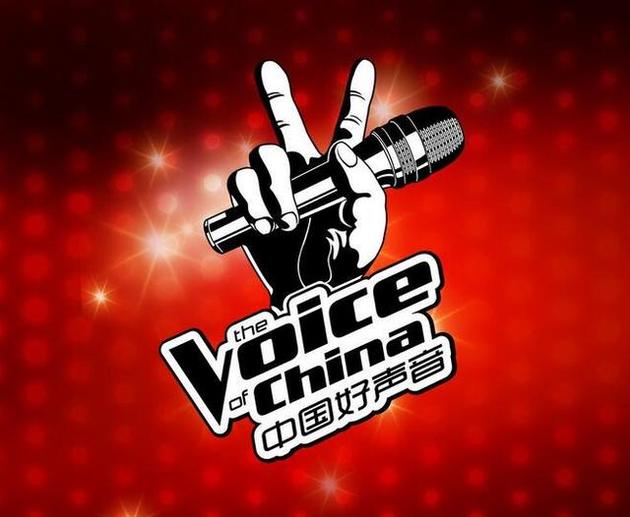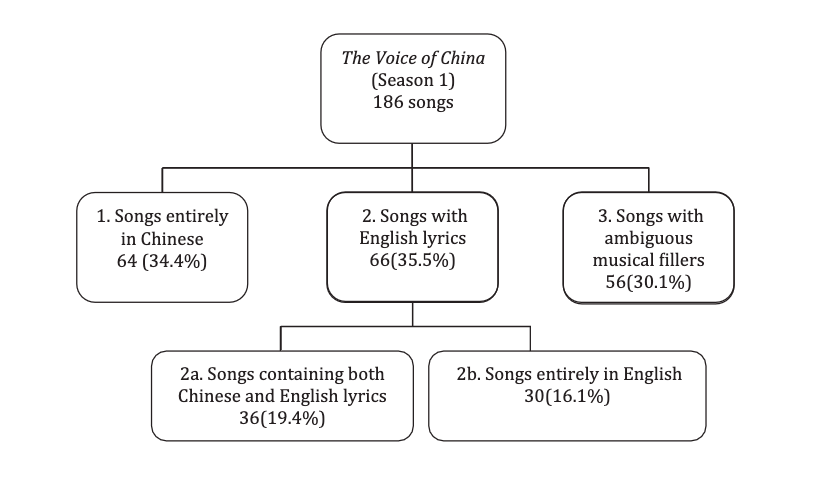Transnational Television formats, according to a Chinese journalist Zhang Yuanchen, becomes more and more crucial in the television industry and global media communication.[1] In China, the rapid development of the popular culture is a recent phenomenon and Cultural Revolution is one of the most important factors that contribute to the growth of television industry. Cultural Revolution was launched by Mao Zedong with the stated goal to preserve the Chinese communism. Beyond all the related political sphere, another important concept being emphasized is liberation. In 1978, the Open Door Policy, set by Deng Xiaoping, allowed political, cultural, and educational exchange with the English-speaking countries.[2] The outcome of the all different kinds of exchanges is to make China enter the international stage.
The Voice of China is one television program that opens to the world in terms of global media communication. Beside from its adaptation of the Dutch version, the presence of English constitutes a large portion of linguistic resources in the show.
First, the advertisement and title had already revealed the show’s transnational feature. As a show being broadcast through Chinese media and channel, the English title is portrayed much larger than the Chinese one, and more importantly, it is not in the direct translation from the Chinese characters written in Pingyin, but has a professional and understandable English name for those who do not read Chinese.

In addition, every time the show resumes after the advertisement, The Voice of China will be officially announced in English first— “This is the Voice… of China!”, then the host will continue stating the sponsors and related trivia. Secondly, in the first round of competition, when the four superstars want the contestant to join their team, they will press the bottom on the rotatable chair to turn around. At this time, the bottom of the chair has an English phrase “I WANT YOU” will light up as they spin. These details are hard to notice because they are not audiences’ main focus, but they are fairly important details that signal the show’s multilingualism.
Admittedly, the nature of The Voice of China is a television entertainment, but its cultural influence is far beyond the surface level. All these seemingly insignificant English sources carefully designed by The Voice of China directors push the show to stand in a global position. The most remarkable English presence is found in the performance. According to the data, in The Voice of China Season 1 (2012), among the 186 songs performed in total, only 34.4% of them have entirely Chinese lyrics, and the rest 65.6% have either English lyrics or ambiguous musical fillers.

https://onlinelibrary.wiley.com/doi/epdf/10.1111/weng.12240
The ambiguous musical fillers refer to the recomposition the original song by changing the Chinese lyrics to the English ones or vice versa. It can also means the mixture of both Chinese and English lyrics if the constant chooses to perform a medley. For instance, a young girl names Li Wenqi sang Coldplay’s “Yellow” entirely in Chinese that attract much attention from the public. This song’s melody is familiar to most audiences. However, especially for the older generations who have no English background could not understand the original English lyrics. Hearing a Chinese version will greatly help them to build up understanding of the music and get more engaged with the music.
Zhang Bichen, who is the winner of The Voice of China 2014, sang a famous Korean song from a drama You Who Came From the Stars in both Korean, English, and Chinese lyrics.
Furthermore, in terms of the recomposition, the report indicates that a large portion of songs were rearranged to include Western pop music genres, such as blues, jazz, and R&B.[3] The diversity make The Voice of China not only limited to Chinese audiences, but open to multiple audience types and genres, which represents the mindset of Liberation and Open Door from the Cultural Revolution. In China, English has long become a mandatary language for children to learn at school. A sixteen-year-old girl named Huang Xiaoyun who comes from a little village in Guizhou not only demonstrate her skillful singing talents, but also show worldwide audiences her fluent and professional English speaking skills after singing “All By Myself.” Her version became sensational at that time and it is so emotional that made a lot of people drawn to the music.
[1] Yuanchen, Zhang, “How Culture Influences Emotion Display in Transnational Television Formats: The Case of The Voice of China.” Media and Communication 6 (2018): 40-47
[2] Zhou, Sijing and Moody, Andrew, “English in The Voice of China.” World Englishes 36 (2017): 554-570
[3] Zhou, Sijing and Moody, Andrew, “English in The Voice of China.” World Englishes 36 (2017): 554-570